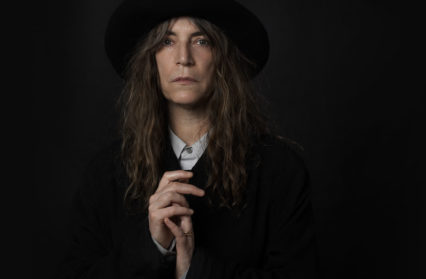Gary Raymond visits Cardiff’s St John the Evangelist Church for the Festival of Voice to watch the authentic, revolutionary rock star that is Patti Smith.
Patti Smith is proof, if you needed it, that rock stars get to choose how they grow old. Not too many years ago, I watched as a woman was politely but firmly removed from an Eric Clapton concert because she had the nerve to repeatedly stand up from her seat and dance. After several warnings via laser pen, “I Shot the Sherriff” was one temptation too much for her, and one transgression too far of that night’s house rules of sit-and-shut-up for the security guards. So that is how Clapton chose to age, by demanding his audience sit in silent adoration and worship at the temple of cod-reggae. He chose to grow old like an asshole. Patti Smith, however, has no such pretensions, and, significantly, has no need of security guards to marshal an audience into paying attention the way that she demands it be paid. This short set, in the subdued resplendence of St John the Evangelist Church in Cardiff as part of the Festival of Voice, has as many poetry readings as songs, and combined with a few anecdotes and exchanges with the audience, it means spoken word is the dominant sound from the altar.
It is an understated affair, although Smith’s reception is one of whispered reverence. There was a time, believe it or not, when she was largely forgotten, deemed irrelevant, but rather like some of her contemporaries like Iggy Pop and Leonard Cohen, who also spent a bit of time in the wilderness away from the cool-school, she is now immovable as an icon of wisdom and rage. Like Cohen, she spent quite some time working against the curious label of “miserablist”, placed on her by journalists and mainstream high-noses who mistake taking the world, and the work, seriously for being depressing. Those who have not seen her live before may, then, have been surprised at how funny she is, how relaxed she is, how open she is on the stage. At the Green Man Festival in 2013, she made a tent of several thousand people feel like they had been invited to tea and biscuits in her front room.
Smith has an on-going relationship with Wales – she rarely plays the UK without a Welsh date or two – and the venues she plays here speak of something about her attitude to gigging and her relationship with audiences. She has enough star power now to pull a few nights at the Royal Festival Hall in London and move on with a nice paycheck, but in the last few decades she has played venues as intimate as Cardiff Bay’s Norwegian Church. So, St John’s is not so unusual for her, and she knows exactly how to treat both the acoustics and the atmosphere. A few crowd-pleasers are given out like gifts with love and warmth. This is not a full band gig – she is flanked by long time conspirators Lenny Kaye on guitar and Tony Shanahan on guitar and keyboards – but “Dancing Barefoot” and “Because the Night” sound full and soaring. This is a festival that (it says it in the name) focusses on the “the voice” and all of its facets; Smith’s is the type that will probably never creak and quake with age, given its starting point, and there are few sounds more enlivening in rock music than when she squeezes down those vowels and pulls them across the hot coals. Even in this quieted atmosphere, the “Iiiiaaeeeeeeeee” of “Ghost Dance” is pretty exhilarating. And it is a short gig – there is the suspicion that, an hour in, both those on stage and those in the audience are just getting into a groove when Smith slides off stage and it’s all over.
As for the poetry, Smith has always been in the tradition of the Beats rather than the punks she is so often chucked in with. The best American “punk poets”, like Smith’s former boyfriend Jim Carroll, have always come from the embrace of Ginsberg and Burroughs, rather than a place of unfettered punkish rage. And so her verse, when delivered in that drawl of hers, is an onslaught of lush thick phrasing and layered imagery – it is a sugar overload for anybody starved of poetry in their lives. But Smith is at the high table of this stuff – she is easily the equal of Ginsberg, the Beats’ poetical High Priest. Tonight she offers up a tantalising balance by reading both extracts from a brand new long work, “The New Jerusalem”, and poems from 1971, when she was barely even a name on the burgeoning New York punk scene, still four years before her classic debut album, Horses, was released. There is a beautiful simplicity to her earlier poems, they are full of open spaces, full of long lazy days when penury mixed with ambition means all there is to do is sit around and think. “The New Jerusalem” is suffocating in its urgency, in its scope, trying to pull in history, religion, myth, the cosmos, the furthest reaches of science and philosophy, into a poem about Trump.
But nobody is here for a poetry workshop, and there are audible gasps in some quarters when she finishes the final reading of her Festival of Voice performance. Patti Smith has decided what kind of rock star she wants to be in her seventies, and it is nothing if not entirely authentic, still the pure revolutionary soul she was when she first broke through. A punk, a hippie, a beat – it really doesn’t matter. She is Patti Smith.
Gary Raymond is a novelist, critic, editor and broadcaster.



 Enjoyed this article? Support our writers directly by buying them a coffee and clicking this link.
Enjoyed this article? Support our writers directly by buying them a coffee and clicking this link.







